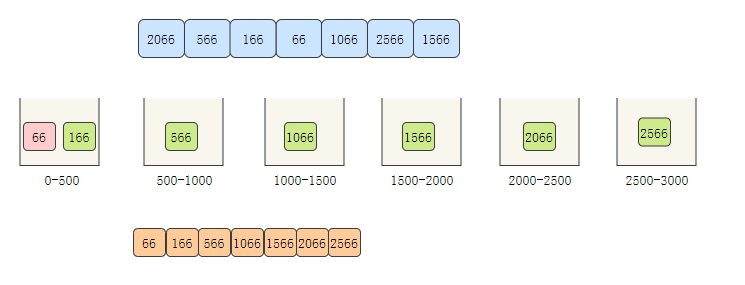这个可以用偏移量解决,找到最大和最小的元素,计算偏移量,例如[9992,9998,9993,9999],偏移量=9999-9992=7,我们只需要建立一个容量为8的数组就可以了。
解决第二个问题的版本如下:
public class CountSort1 { public void sort(int[] nums) { //查找最大值 int max = findMax(nums); //寻找最小值 int min = findMin(nums); //偏移量 int gap = max - min; //创建统计次数新数组 int[] countNums = new int[gap + 1]; //将nums元素出现次数存入对应下标 for (int i = 0; i < nums.length; i++) { int num = nums[i]; countNums[num - min]++; nums[i] = 0; } //排序 int index = 0; for (int i = 0; i < countNums.length; i++) { while (countNums[i] > 0) { nums[index++] = min + i; countNums[i]--; } } } public int findMax(int[] nums) { int max = nums[0]; for (int i = 0; i < nums.length; i++) { if (nums[i] > max) { max = nums[i]; } } return max; } public int findMin(int[] nums) { int min = nums[0]; for (int i = 0; i < nums.length; i++) { if (nums[i] < min) { min = nums[i]; } } return min; } } 计数排序性能分析时间复杂度
我们整体运算次数是n+n+n+k=3n+k,所以使劲复杂度是O(n+k)。
空间复杂度
引入了辅助数组,空间复杂度O(n)。
稳定性
我们的实现实际上是不稳定的,但是计数排序是有稳定的实现的,可以查看参考[1]。
同时我们通过实现也发现,计数排序实际上不适合有负数的,元素偏移值过大的数组。
桶排序桶数组可以看做计数排序的升级版,它把元素分到若干个桶中,每个桶中的元素再单独排序。
桶排序原理桶排序大概的过程:
设置一个定量的数组当作空桶;
遍历输入数据,并且把元素一个一个放到对应的桶里去;
对每个不是空的桶进行排序;
从不是空的桶里把排好序的数据拼接起来。
桶排序动图如下(动图来源参考[1]):
![桶排序动图(来源参考[1])](/uploads/allimg/211226/093502D41_0.gif)
我们上面说了,计数排序不适合偏移量过大的数组,我们拿一个偏移量非常大的数组[2066,566,166,66,1066,2566,1566]为例,来看看桶排序的过程。
创建6个桶,分别存储0-500,500-1000,1000-1500,1500-2000,2000-2500,2500-3000的元素

遍历数组,将元素分别分配到对应的桶中

桶中元素排序,这里我们明显只用排序第一个桶

将桶中的元素依次取出,取出的元素就是有序的了

桶排序的实现我们要考虑几个问题:
桶该如何表示?
桶的数量怎么确定?
桶内排序用什么方法?
我们来看一下代码:
public class BucketSort { public void sort(int[] nums) { int len = nums.length; int max = nums[0]; int min = nums[0]; //获取最大值和最小值 for (int i = 1; i < len; i++) { if (nums[i] > max) { max = nums[i]; } if (nums[i] < min) { min = nums[i]; } } //计算步长 int gap = max - min; //使用列表作为桶 List<List<Integer>> buckets = new ArrayList<>(); //初始化桶 for (int i = 0; i < gap; i++) { buckets.add(new ArrayList<>()); } //确定桶的存储区间 int section = gap / len - 1; //数组入桶 for (int i = 0; i < len; i++) { //判断元素应该入哪个桶 int index = nums[i] / section - 1; if (index < 0) { index = 0; } //对应的桶添加元素 buckets.get(index).add(nums[i]); } //对桶内的元素排序 for (int i = 0; i < buckets.size(); i++) { //这个底层调用的是 Arrays.sort // 这个api不同情况下可能使用三种排序:插入排序,快速排序,归并排序,具体看参考[5] Collections.sort(buckets.get(i)); } //将桶内的元素写入原数组 int index = 0; for (List<Integer> bucket : buckets) { for (Integer num : bucket) { nums[index] = num; index++; } } } } 桶排序性能分析时间复杂度

